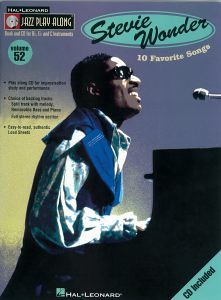Stevie Wonder Biography
Stevland Hardaway Morris (; né Judkins; born May 13, 1950), known professionally as Stevie Wonder, is an American singer-songwriter, musician, and record producer. He is credited as a pioneer and influence by musicians across a range of genres that include R&B, pop, soul, gospel, funk, and jazz. A virtual one-man band, Wonder's use of synthesizers and other electronic musical instruments during the 1970s reshaped the conventions of contemporary R&B. He also helped drive such genres into the album era, crafting his LPs as cohesive and consistent, in addition to socially conscious statements with complex compositions. Blind since shortly after his birth, Wonder was a child prodigy who signed with Motown's Tamla label at the age of 11, where he was given the professional name Little Stevie Wonder. Wonder's single "Fingertips" was a No. 1 hit on the Billboard Hot 100 in 1963, at the age of 13, making him the youngest solo artist ever to top that chart. Wonder's critical success was at its peak in the 1970s. His "classic period" began in 1972 with the releases of Music of My Mind and Talking Book, the latter featuring "Superstition", which is one of the most distinctive and famous examples of the sound of the Hohner Clavinet keyboard. His works Innervisions (1973), Fulfillingness' First Finale (1974) and Songs in the Key of Life (1976) all won the Grammy Award for Album of the Year, making him the only artist to have won the award with three consecutive album releases. Wonder began his "commercial period" in the 1980s; he achieved his biggest hits and highest level of fame, had increased album sales, charity participation, high-profile collaborations (including with Paul McCartney and Michael Jackson), political impact, and television appearances. Wonder has continued to remain active in music and political causes. Wonder is one of the best-selling music artists of all time, with sales of over 100 million records worldwide. He has won 25 Grammy Awards (the most by a mal...





































































![Flava In Ya Ear (Remix) [feat. Stevie Wonder, Raheem DeVaughn, PJ Morton, Naturally 7 & Avery*Sunshine] by Mike Phillips music video](https://cdn.musicareview.com/image/thumb/Video123/v4/6d/cd/5f/6dcd5fee-abc8-260d-f09f-cdd7dd00fae3/748926835329_cover.jpg/100x100bb.jpg)


